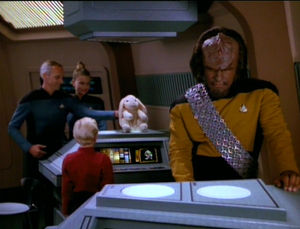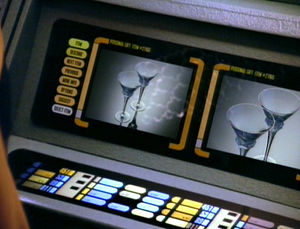Difference between revisions of "Replicator"
| Line 1: | Line 1: | ||
[[Image:Replimat.jpg|thumb|right|A replicator station on the [[Enterprise-D|''USS Enterprise'']]]] | [[Image:Replimat.jpg|thumb|right|A replicator station on the [[Enterprise-D|''USS Enterprise'']]]] | ||
[[Image:Replimat console.jpg|thumb|right|A replicator console]] | |||
A '''replicator''' is a device that transforms raw materials into finished products by reorganizing matter to fit a specified pattern. Replicators began to be common appliances among the major [[Star Trek]] civilizations in the 24th century. | A '''replicator''' is a device that transforms raw materials into finished products by reorganizing matter to fit a specified pattern. Replicators began to be common appliances among the major [[Star Trek]] civilizations in the 24th century. | ||
Revision as of 20:37, 12 January 2009

A replicator is a device that transforms raw materials into finished products by reorganizing matter to fit a specified pattern. Replicators began to be common appliances among the major Star Trek civilizations in the 24th century.
Replicators use technology similar to transporters, but they do not have the same resolution. Consequently, replicated objects have "single bit errors" that make them distinguishable from the object used to make the pattern. Furthermore, the lack of resolution makes it impossible to replicate living creatures, and many non-living materials are also too complex to replicate.
Common Arguments
Trekkies often argue that replicators radically alter the economics of the future, creating a society in which anyone can have anything they want, thereby justifying the moneyless society of the Federation. The argument is absurd because replicators do not create products from nothing: they require power, patterns, feedstock (raw materials), and maintenance. There are many products they simply can't produce, and many of the products they can make are considered inferior to similar products made by other means. Consequently, they do not remove the supply and demand considerations of an economy; they just change the value and availability of certain commodities. This assessment is confirmed by the Ferengi economy, which continues to be a thriving capitalist economy despite the widespread use of replicators by the Ferengi.
